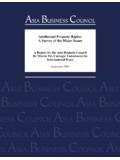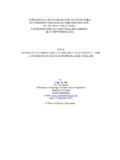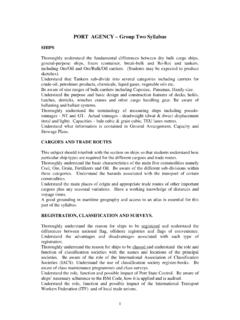Transcription of Incoterms 2000 - Valueway
1 Incoterms 2000 Incoterms 2000 International commercial terms are a series of international sales terms, published by International chamber of commerce (ICC) and widely used in international commercial transactions. They are used to divide transaction costs and responsibilities between buyer and seller and reflect state-of-the-art transportation practices. They closely correspond to the Convention on Contracts for the International Sale of Goods. The first version was introduced in 1936 and the present dates from 2000 . Liquidation The process by which a company (or part of a company) is brought to an end, and the assets and property of the company redistributed. CFR Cost and Freight (named destination port) Seller must pay the costs and freight to bring the goods to the port of destination. However, risk is transferred to the buyer once the goods have crossed the ship's rail. Maritime transport only. CIF Cost, Insurance and Freight (named destination port) Exactly the same as CFR except that the seller must in addition procure and pay for insurance for the buyer.
2 Maritime transport only. CPT Carriage Paid To (named place of destination) The general/containerized/multimodal equivalent of CFR. The seller pays for carriage to the named point of destination, but risk passes when the goods are handed over to the first carrier. CIP Carriage and Insurance Paid (To) (named place of destination) The containerized transport/multimodal equivalent of CIF. Seller pays for carriage and insurance to the named destination point, but risk passes when the goods are handed over to the first carrier. DAF Delivered At Frontier (named place) This term can be used when the goods are transported by rail and road. The seller pays for transportation to the named place of delivery at the frontier. The buyer arranges for customs clearance and pays for transportation from the frontier to his factory. The passing of risk occurs at the frontier. DES Delivered Ex Ship (named port) Where goods are delivered ex ship, the passing of risk does not occur until the ship has arrived at the named port of destination and the goods made available for unloading to the buyer.
3 The seller pays the same freight and insurance costs as he would under a CIF arrangement. Unlike CFR and CIF terms, the seller has agreed to bear not just cost, but also Risk and Title up to the arrival of the vessel at the named port. Costs for unloading the goods and any duties, taxes, are for the Buyer. A commonly used term in shipping bulk commodities, such as coal, grain, dry chemicals and where the seller either owns or has chartered, their own vessel. DEQ Delivered Ex Quay (named port) This is similar to DES, but the passing of risk does not occur until the goods have been unloaded at the port of destination. DDU Delivered Duty Unpaid (named destination place) This term means that the seller delivers the goods to the buyer to the named place of destination in the contract of sale. The goods are not cleared for import or unloaded from any form of transport at the place of destination. The buyer is responsible for the costs and risks for the unloading, duty and any subsequent delivery beyond the place of destination.
4 However, if the buyer wishes the seller to bear cost and risks associated with the import clearance, duty, unloading and subsequent delivery beyond the place of destination, then this all needs to be explicitly agreed upon in the contract of sale. DDP Delivered Duty Paid (named destination place) This term means that the seller pays for all transportation costs and bears all risk until the goods have been delivered and pays the duty. Also used interchangeably with the term "Free Domicile". The most comprehensive term for the buyer. In most of the importing countries, taxes such as (but not limited to) VAT and excises should not be considered prepaid being handled as a "refundable" tax. Therefore VAT and excises usually are not representing a direct cost for the importer since they will be recovered against the sales on the local (domestic) market. EXW Ex Works (named place): The seller makes the goods available at his premises.
5 The buyer is responsible for all term may be the easiest to administer, however may not be in the seller's best interests. There is no control over the final destination of the goods. It may be possible for the seller to negotiate better freight rates than the buyer. FCA Free Carrier (named place) The seller hands over the goods, cleared for export, into the custody of the first carrier (named by the seller) at the named place. This term is suitable for all modes of transport, including carriage by air, rail, road, and containerised / multi-modal transport. FAS Free Alongside Ship (named loading port) The seller must place the goods alongside the ship at the named port. The seller must clear the goods for export; this changed in the 2000 version of the Incoterms . Suitable for maritime transport only. FOB Free on board (named loading port) The classic maritime trade term. The seller must load the goods on board the ship nominated by the buyer, cost and risk being divided at ship's rail.
6 The seller must clear the goods for export. Maritime transport only. It also includes Air transport when the seller is not able to export the goods on the schedule time mentioned in the letter of credit. In this case the seller allows a deduction of sum equivalent to the carriage by ship from the air carriage FOB Freight On Board is commonly used when shipping goods within the United States, to indicate who pays loading and transportation costs, and/or the point at which the responsibility of the goods transfers from shipper to buyer. This usage derives from the now obsolete US "Foreign Trade Definitions" of 1941. "FOB shipping point" or "FOB origin" indicates the buyer pays shipping cost, and takes responsibility for the goods when the goods leave the seller's premises. "FOB destination" designates the seller will pay shipping costs, and remain responsible for the goods until the buyer takes possession. A related but separate term "CAP" ("customer arranged pickup") is used to denote that the buyer will arrange a carrier of their choice to pick the goods up at the seller's premises, and the liability for any damage or loss belongs to the buyer.
7 PO Purchase order a commercial document issued by a buyer to a seller, indicating types, quantities, and agreed prices for products or services the seller will provide to the buyer. Sending a PO to a supplier constitutes a legal offer to buy products or services. Acceptance of a PO by a seller usually forms a one-off contract between the buyer and seller, so no contract exists until the PO is accepted. Surplus. Any inventory, merchandise, or equipment that can no longer be sold at the regular retail or wholesale price, but still possesses value. Surplus is generally caused by discontinuations, overruns, closeouts or overstock. Most businesses have a need to liquidate 2-5% of their products as surplus. References International chamber of commerce (ICC) incoterm list Incoterms 2000 Incoterms 2000 (International Business Community)







